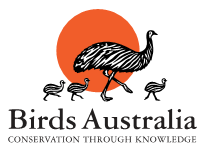
ACN 004 076 475
Suite 2-05,
60 Leicester Street, Carlton VIC 3053
Australia
Statement of Concern
Reclamation Proposal for Song Do Tidal Flats
Birds Australia, a peak Australian bird conservation organisation, has expressed concern at the recent approval of the final stage of the Song Do reclamation project by the Government of the Republic of Korea.
The approval by the Review Panel of 715 hectares of the total area of 1015 hectares under consideration will have significant adverse impacts on the biodiversity of the area and in particular the migratory waterbirds that have been recorded at the Song Do tidal flats.
In recent years Birds Australia has partnered with Birds Korea to develop a better knowledge of the importance of the West coast of Korea for migratory shorebirds. The nationwide shorebird survey in May 2008 counted approx. 270 000 shorebirds (Moores et al., 2008). Of this total, 18 218 were on the Song Do tidal flats. These counts show the importance of the tidal flats that will be impacted by the reclamation.
Birds Australia participated as an official Observer at the Ramsar Conference of the Parties held in Changwon in October 2008. Along with many other participants at the Conference, Birds Australia welcomed the positive position adopted by the Republic of Korea in Ramsar Resolution X.22, paragraph 22, that “intertidal mudflats should be preserved and that no large-scale reclamation projects are now being approved in the Republic of Korea.”
However, the approval of the Song Do reclamation project clearly contradicts this very positive statement made by the Government of the Republic of Korea and is especially disappointing in view of the position taken at the Ramsar Conference.
The impacts on at least thirteen species of waterbirds at Song Do from the reclamation project are very likely to be significant.
Records of waterbird presence since 2006/07 at the Song Do tidal flat show that ten of the thirteen species of waterbirds recorded at Song Do occur in internationally important concentrations as defined by the Ramsar Convention including two endangered species, one vulnerable species and the largest concentration of a near-threatened species in the Republic of Korea.
The tidal flats in Song Do were formerly very extensive (over 5000 hectares) and formed part of the massive Gyeonggi Bay tidal flat system. However, most of the tidal flats at Song Do have already been reclaimed from works initiated in the 1970s and 1980s. There is now only one large and complex area of tidal flat remaining at Song Do and it is this area that is to be reclaimed.
The Ministry of Land, Transport and Maritime Affairs has recently developed the National Wetlands Management Plan (2007-11) which aims, among other goals, for a no national net loss of wetlands. It is difficult to see how this very positive objective can be achieved with ongoing reclamation projects such as the Song Do project.
While the economic value of some of the past reclamation works is recognised, the environmental and social costs are increasing dramatically as these areas continue to decline and the adverse impacts on migratory waterbirds will increase.
Birds Australia urges the Government of the Republic of Korea to give greater recognition to the international importance of the tidal flats of the West coast of the Korean peninsular for the conservation of migratory birds.
Alison Russell-French
President
Birds Australia



